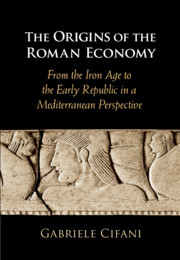 The Origins of the Roman Economy
The Origins of the Roman Economy Book contents
- The Origins of the Roman Economy
- The Origins of the Roman Economy
- Copyright page
- Dedication
- Epigraph
- Contents
- Figures
- Tables
- Acknowledgements
- One Introduction
- Two Notes on the Geographical Context of Early Rome
- Three The Beginnings of a Longue Durée
- Four The Early Iron Age (Latial Phases II and III)
- Five A Settlement Unlike Others
- Six Latial Phase IV (730–580 BC)
- Seven Latial Phase IVA (730–640 BC)
- Eight Latial Phase IVB (640–580 BC)
- Nine The Archaic Phase (580–500 BC)
- Ten Modelling Demography and Consumption
- Eleven Places and Institutions in the Archaic Roman Economy
- Twelve The Economics of the Early Calendar
- Thirteen The Early Latins Overseas
- Fourteen The Fifth Century BC
- Fifteen Crisis and Opportunities in the Fifth Century BC
- Sixteen The Fourth Century BC
- Seventeen Fourth-Century Transformations and the End of the Archaic Economy
- Eighteen Epilogue
- Book part
- Notes
- Bibliography
- Index
Sixteen - The Fourth Century BC
Published online by Cambridge University Press: 18 February 2021
- The Origins of the Roman Economy
- The Origins of the Roman Economy
- Copyright page
- Dedication
- Epigraph
- Contents
- Figures
- Tables
- Acknowledgements
- One Introduction
- Two Notes on the Geographical Context of Early Rome
- Three The Beginnings of a Longue Durée
- Four The Early Iron Age (Latial Phases II and III)
- Five A Settlement Unlike Others
- Six Latial Phase IV (730–580 BC)
- Seven Latial Phase IVA (730–640 BC)
- Eight Latial Phase IVB (640–580 BC)
- Nine The Archaic Phase (580–500 BC)
- Ten Modelling Demography and Consumption
- Eleven Places and Institutions in the Archaic Roman Economy
- Twelve The Economics of the Early Calendar
- Thirteen The Early Latins Overseas
- Fourteen The Fifth Century BC
- Fifteen Crisis and Opportunities in the Fifth Century BC
- Sixteen The Fourth Century BC
- Seventeen Fourth-Century Transformations and the End of the Archaic Economy
- Eighteen Epilogue
- Book part
- Notes
- Bibliography
- Index
Summary
During the fourth century BC, the economy of Rome changed profoundly in terms of the acquisition and control of land. The whole period was characterised by dialectics between patricians and plebeians, and by land reforms and colonisation, culminating in the passing of the leges Liciniae Sextiae in 367 BC and Appius Claudius’ social reforms of 312 BC, which took place when Rome already had already full control of the central coastal Tyrrhenian area and of a great part of southern Italy.
- Type
- Chapter
- Information
- The Origins of the Roman EconomyFrom the Iron Age to the Early Republic in a Mediterranean Perspective, pp. 211 - 219Publisher: Cambridge University PressPrint publication year: 2020


